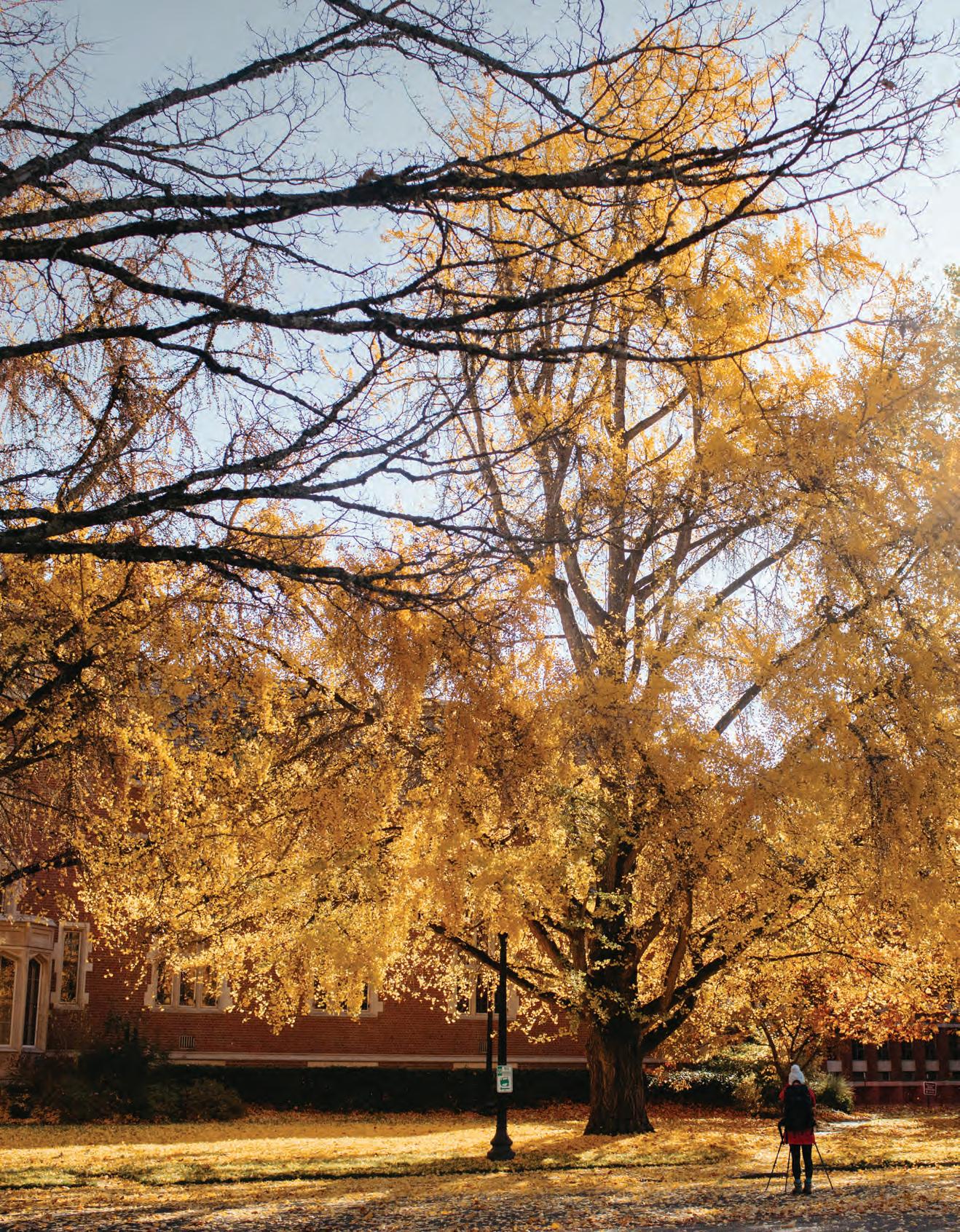
14 minute read
Eliot Circular
news from campus
photo by lauren labarre Furthering Reed’s Commitment to Sustainability
In October, the Board of Trustees voted to curtail Reed’s endowment investments in fossil fuels. The move is in line with other colleges and universities that have announced fossil-fuel divestment strategies, and was shared in the following letter.
Dear Reed community:
We write to provide an update on the management of Reed College’s endowment and Reed’s Board of Trustees’ ongoing discussions with respect to the college’s approach to sustainability. On Saturday, the Reed College Board of Trustees voted to direct Reed’s Investment Committee to take the following actions related to the endowment’s investments in fossil fuels:
Prohibit any new investments in public funds or private partnerships that are focused on the oil, gas, and coal industries, including infrastructure and field services. This includes 1) acquiring, developing, producing, or exploring for oil, gas, and coal; and 2) providing equipment, services, and infrastructure related to these industries.
Phase out all such existing investments in private partnerships in accordance with the funds’ typical life cycles, or sooner if both prudent and practicable.
While the board has a fiduciary duty to protect the health and integrity of the endowment, which provides crucial support for college operations, the decision to curtail Reed’s endowment investments in fossil fuels is a direct result of years of thoughtful community discussions and demonstrates an expansion of Reed’s institutional commitment to sustainability. The board recognizes the current climate crisis as substantially the result of greenhouse gas accumulation associated with the combustion of fossil fuels. Beyond the college’s own actions to reduce its carbon footprint, the board believes that steady reduction in fossil fuel use now represents an issue of global importance that affects all of humanity, a position that, in alignment with Reed’s Investment Responsibility Policy, “reflects widely held, perhaps almost universally held, social or moral positions.” The vote thus represents an evolution of the board’s views regarding Reed’s endowment investments in fossil fuels (see Statement: July 2014 and Statement: December 2019).
We take this opportunity to reaffirm the college’s commitment to Reed’s Sustainability Mission. The sustainability measures that the college and our community have implemented, evident across a range of activities and programs, are significant. In addition to the notable reduction in carbon emissions—a reduction of more than 2.6 million pounds per year since 2013—Reed’s most important contribution to sustainability is our work to educate students to become leaders in careers and institutions that develop sustainable approaches. We take great pride in the strength of Reed’s environmental studies program, the support that the Center for Life Beyond Reed provides students who seek careers in sustainability, and the academic research opportunities at Reed related to environmental issues.
Reflecting on the series of robust debates and forums that led to the board’s decision, such as the Reed Union: Community Responsibility in a Time of Climate Crisis, we extend our appreciation to past and present members of Reed’s Sustainability Committee, Fossil Free Reed, Greenboard, and many members of our community for tackling complex concerns with open discourse and thoughtful determination. We also thank the Board of Trustees for its sustained engagement on this important issue.
Sincerely, Roger M. Perlmutter ’73 Chairman, Reed College Board of Trustees
Audrey Bilger President, Reed College
Merck Foundation Gift Honors Reed Trustee
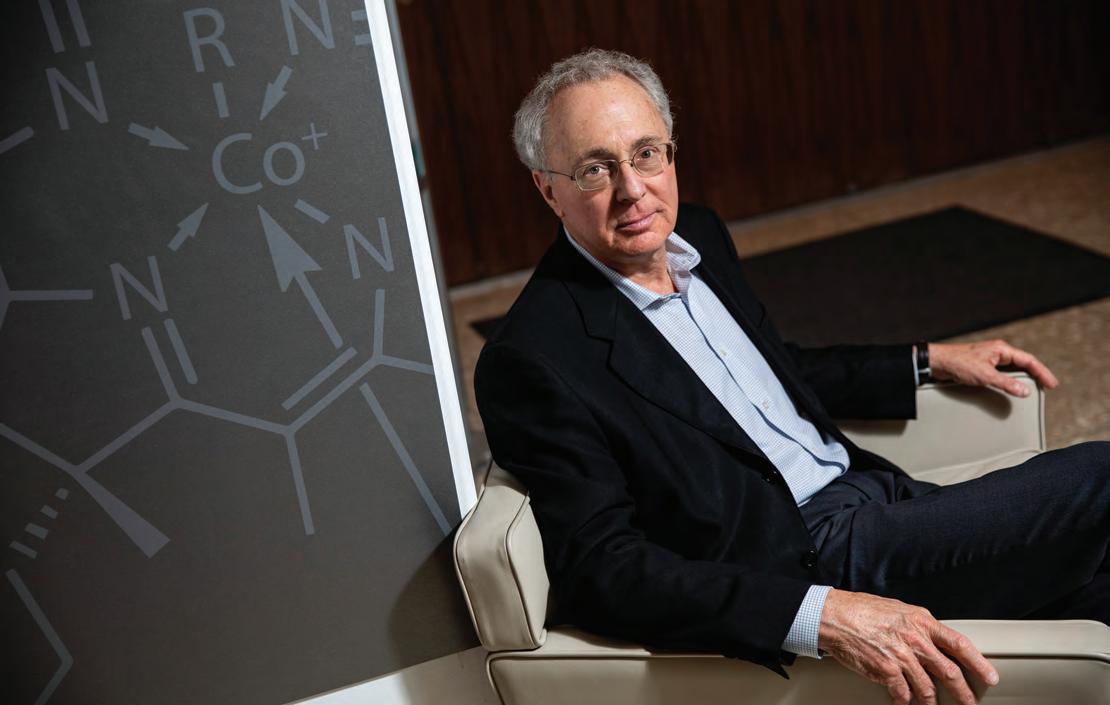
The Merck Foundation made a gift to Reed to honor Roger Perlmutter ’73, chair of the board of trustees.
The Merck Foundation has made a $1.5 million gift to Reed to honor leading immunologist and Reed trustee Roger Perlmutter ’73, who retired last year as executive vice president of Merck Research Laboratories.
The gift creates the Roger M. Perlmutter Professorship in Biological Sciences, which has been awarded to Prof. Suzy Renn [see page 11].
“When I arrived at Reed in 1969 I thought that I might become a poet,” says Perlmutter. “However, in part because I had no talent in this line of work, my attention was increasingly drawn to the sciences. I am enormously grateful to Reed for providing the robust intellectual environment that enabled me to pursue interdisciplinary research, and I am delighted that the Merck Foundation has made this commitment to ensure that students now and in the future will gain the benefit of the extraordinary education that Reed provides.”
Perlmutter majored in biology at Reed and wrote his thesis on immune suppression with Prof. Larry Ruben [biology 195592]. He went on to earn both MD and PhD degrees from Washington University in St. Louis and became professor and chairman of the Department of Immunology at the University of Washington in Seattle. He also served as a professor in the Departments of Medicine and Biochemistry there, and as an Investigator of the Howard Hughes Medical Institute. He is a fellow of the American Academy of Arts and Sciences and the American Association for the Advancement of Science, and both a Distinguished Fellow and past president of the American Association of Immunologists.
Perlmutter joined Merck in 1997 as executive vice president of basic and preclinical research. From 2001 to 2012, he served as executive vice president and head of research and development at Amgen. He returned to Merck in 2013, serving as executive vice president and president of Merck Research Laboratories until last year.
Perlmutter has worked on scores of vaccines and therapeutics for multiple cancers, diabetes, and infections caused by Ebola virus, human immunodeficiency virus, hepatitis C virus, and cytomegalovirus. He is perhaps best known for his work on pembrolizumab, an immunotherapy drug he helped develop at Merck, which is used to treat certain types of cancer. In his final years at Merck, he worked with a team that developed molnupiravir, an oral, direct-acting antiviral for the treatment of COVID-19. He is now chairman and chief executive officer of Eikon Therapeutics.
Perlmutter joined Reed’s board of trustees in 2004 and has served as chair since 2010. This is the second professorship at Reed to carry his name. The first, the Amgen-Perlmutter Professorship of Biology and Chemistry, was created by Amgen when he left the company in 2012.
—CHRIS LYDGATE ’90
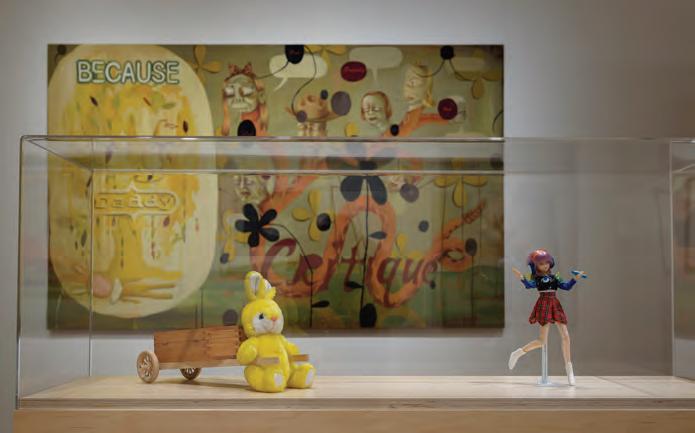
photo by nina johnson ’99
Works by Georganne Deen and Nayland Blake, part of the Cooley Gallery exhibition No Face, No Case: Portraiture’s Breaking.
No Face, No Case
No Face, No Case, Portraiture’s Breaking, a new exhibition of photography, painting, and sculpture at the Douglas F. Cooley Memorial Art Gallery, explores and expands the boundaries of portraiture as an artistic tradition. It is the first exhibition at the Cooley since the gallery closed its doors as a result of the COVID-19 pandemic, and the first ever researched and organized by a class of Reed student curators.
Many of the works on display were the first of their kind to depict queer subjects and subjects of color “in such a radical way,” according to Stephanie Snyder ’91, the John and Anne Hauberg Curator and Director of the Cooley. In No Face, No Case, what matters is not just who or what we are looking at, but also how we are seeing, especially when the work of art may not seem like a portrait at all.
As the representation of the likeness of an individual, portraiture has a long history as a form of currency, dating back to court portraits of royalty and aristocrats. The exhibition interrogates this tradition and the power relationships involved, breaking down the expectations of what a portrait should be or whom it should portray.
Featuring photographs by the likes of Catherine Opie, Yasumasa Morimura, and Laura Aguilar, the exhibition asks what kinds of relationships viewers might form with the works of art that undermine the systems of state power and surveillance alluded to in the title.
“We wanted works in the exhibition to speak to a sense of deeply close encounter while not reinforcing positions of power and dominance,” Snyder says. “When you encounter Laura Aguilar’s intimate photographs, for example, you encounter multiple perspectives at once—perspectives on power and history and the future.”
The show was organized by a group of faculty and student curators who took part in Art 353, Making an Exhibition, taught by Snyder, Prof. William Diebold, and Prof. Kris Cohen.
Prof. Diebold had been hoping to teach a course like this ever since he arrived at Reed. “I wanted the students to be able to do everything,” he says.
Over the semester, the students and professors conceived, researched, and designed an exhibition influenced by the challenges of the COVID-19 pandemic, the national reckoning with anti-Black racism, and being isolated from each other in the digital learning environment.
“I had never been in a class before that so heavily centered collective, creative practice,” says Aliza Phillips ’21.
The exhibition is curated from a group of over 50 works of art donated to Reed College by Peter Norton ’65, who has demonstrated a commitment to collecting works by LGBTQ+ and BIPOC artists since he began his career as an art collector during the AIDS crisis and the culture wars in the early 1990s. This donation provided the opportunity for this experiential learning experience. —BEN READ ’21
photo by Jason Timochko
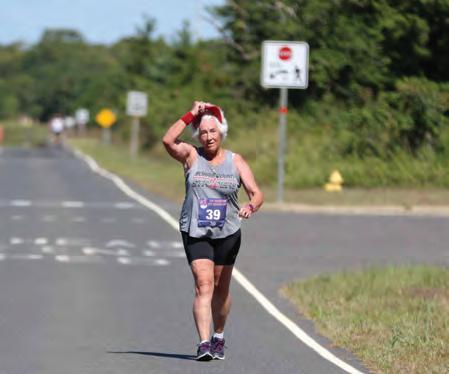
RANDOM WALK
Some Things We Learned From Reading This Issue
Kathleen Bucklin Davies ’67 is now the national 12K champion for her age group (75-79 years) after running the USATF Championship race in Sandy Hook, New Jersey. “I know there are women faster than I am, but you have to be there and you have to run,” she said. “I was and I did!” PAGE 30
Segel’s First Law: All problems are essentially problems of diplomatic history. Segel’s Second Law: Always save room for dessert. PAGE 36
Girls in Sparta in the sixth century BCE sometimes wore chitōniskoi or short tunics. These garments may be what inspired the lyric poet Ibykos to describe Spartan girls as phainomērides or “thigh-flashers.”
PAGE 48
Partly because of the harsh ultraviolet light that blankets the Tibetan plateau, cataracts are rampant and blindness is common. In the 1990s, ophthalmologist Marc Lieberman ’70 traveled to Tibet to share new surgical techniques with local doctors, restoring the sight of thousands of people. PAGE 47
During the 1970s, tables at the Portland restaurant Indigene, run by Millie Howe ’58 and Prof. Howard Waskow [English 1964-72], were booked so far in advance that at least one divorce settlement stipulated which party would be awarded a coveted reservation there. PAGE 42
Warming oceans and declining populations of turtles have fueled a steady increase in populations of box jellyfish, fearsome cnidarians whose venom is so powerful it can kill swimmers unfortunate enough to tangle with it. PAGE 27
INSPIRING PROFESSORS NAMED TO CHAIRS
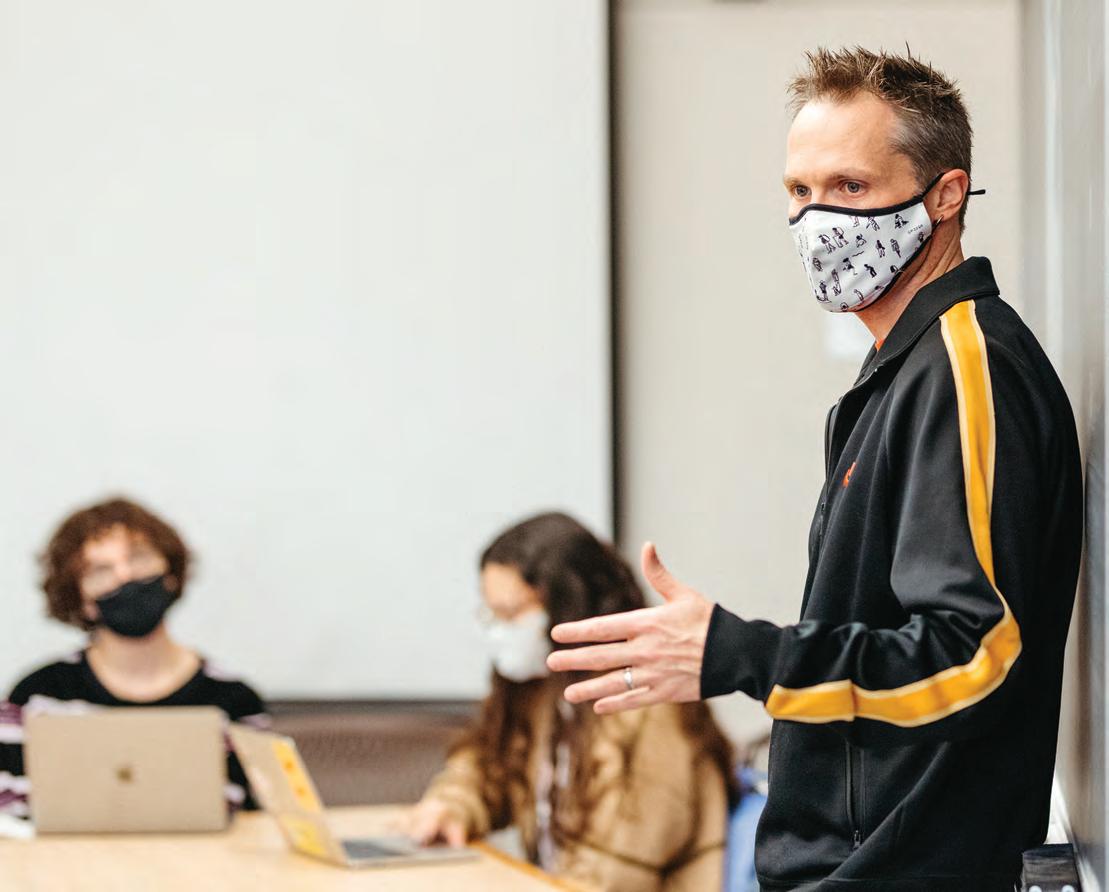
Professor Chris Koski
For more than 100 years, Reed professors have set themselves apart by treating students as intellectual peers—“Comrades of the Quest,” to borrow President William T. Foster’s memorable phrase. Here we celebrate six professors who have recently been appointed to prestigious chairs—a mark of esteem from their colleagues and a recognition of their knack for inspiring students.
Prof. Jon Rork
George Hay Professor of Economics Prof. Rork studies public finance. His current research interests lie in the realms of state taxation, interjurisdictional competition, and the economic determinants of interstate migration, especially as they pertain to the elderly. He has published his research in journals including the Journal of Urban Economics, Regional Science and Urban Economics, National Tax Journal, Journal of Regional Science, and Public Finance Review. He teaches courses in microeconomic theory, game theory and urban economics. He earned his PhD from Stanford and has taught at Reed since 2010.
The Hay Chair honors Prof. George Hay, who joined the Reed faculty in 1956 and worked extensively in international economics, traveling to Indonesia, South America, and Africa. A powerhouse for the college, Hay served as the director of admissions from 1958–1964, vice president and treasurer from 1973–1979, executive vice president from 1979–1980, and acting president in 1980–81. The chair was established in 1989 through the leadership of longtime trustee Richard P. Wollenberg. Ultimately, donors contributed more than 100 gifts to endow a professorship in Hay’s memory.
Prof. Suzy Renn
Roger M. Perlmutter Professorship in Biological Sciences Prof. Renn is a neuroscientist who studies the evolution of social behavior. She’s an expert on African cichlids, a type of fish that has experienced an incredibly rapid evolutionary radiation, resulting in thousands of closely related species that exhibit a wealth of morphological and behavioral diversity despite very low genomic sequence divergence. She’s been teaching at Reed since 2006.
The Perlmutter Professorship was created this year by the Merck Foundation to honor longtime trustee Roger Perlmutter ’73 on the occasion of his retirement as executive vice president of Merck Research Laboratories. The chair will help anchor instruction in biology at Reed while contributing to the legacy of one of the college’s most important leaders.
Prof. Jan Mieszkowski
Reginald F. Arragon Chair in Humanities Prof. Mieszkowski is a specialist in 18th and 19th European literature and philosophy. He teaches courses in German and comparative literature and literary theory, ancient and modern humanities, and continental philosophy. He is the author of three books: Labors of Imagination (2006), Watching War (2012), and Crises of the Sentence (2019). He holds a PhD in German literature from Johns Hopkins University and has taught at Reed since 1997.
The Arragon Chair was created by James C. March ’77 and Melissa March in honor of Rex Arragon, a beloved professor of history [1923–74]. After attending Reed, Jim studied the economics of information at Stanford University. He went on to found WJM Technologies, a software company that developed tools to detect bank fraud.
Prof. Kambiz GhaneaBassiri
Thomas Lamb Eliot Professor of Religion and Humanities Prof. GhaneaBassiri specializes in Islamic studies and American religious history. He was named a Carnegie Scholar for his book A History of Islam in America and a Guggenheim Fellow for his work on the mosque in Islamic history. He teaches courses on humanities, Islam, theory and method in the study of religion, and religious diversity. He joined Reed in 2002 after earning a PhD in religion at Harvard University.
The Thomas Lamb Eliot Memorial Fund for Religion was established in 1953 by his son, William Greenleaf Eliot Jr. Thomas Lamb Eliot was the chair of the founding board of trustees and served as a trustee from 1911 to 1925. Following in his father’s footsteps, Eliot, Jr. served as a trustee from 1925 to 1941. The endowment supports religious interests and studies of the students, faculty, and community of Reed.
Prof. Kris Cohen
Jane Neuberger Goodsell Professor of Art History and Humanities Prof. Cohen is trained as a media theorist and an art historian. His research interests include modern and contemporary art, networked and computational media, critical theory, affect theory, queer theory, and Black studies. He’s the author of Never Alone, Except for Now: Art, Networks, Populations (2017). He teaches courses on the history of modern art, video art, the politics of representation, art and technology, and the arts of capitalism. He earned his PhD in art history from the University of Chicago and has taught at Reed since 2011.
The Goodsell Chair, created by Sue and Edward Cooley and John and Betty Gray, honors author and columnist Jane Neuberger Goodsell ’42. Goodsell majored in English literature at Reed and began her writing career as she was raising three daughters. In addition to her column From Soup to Nonsense, which was syndicated in the national labor press, Goodsell published her first children’s book, Katie’s Magic Glasses, in 1965. Her later books include Toby’s Toe, Not a Good Word About Anybody, and children’s biographies of Eleanor Roosevelt, the Mayo brothers, and Hawaii senator Daniel Inouye.
Prof. Chris Koski
Daniel B. Greenberg Chair in Environmental Studies Prof. Koski is an expert on the political dimensions of policy making, such as environmental policy, energy policy, public budgeting, and climate change. He currently teaches courses on American politics, public policy, state and local politics and policy, and environmental politics and policy. He can be found talking politics and policy anywhere, but particularly where there is pinball, barbecue, good fishing, or wild things. He earned his PhD from the University of Washington and came to Reed in 2011.
The Greenberg Chair was created this year in memory of Daniel B. Greenberg ’62, who served on Reed’s board of trustees for more than 45 years and oversaw growth and transformation in every area of the college. His philanthropic leadership in collaboration with his wife, Susan Steinhauser, was instrumental to several essential initiatives, including environmental studies. The environmental studies chair will support generations of talented teacher-scholars in this important field of endeavor and further Dan’s remarkable legacy at Reed.







